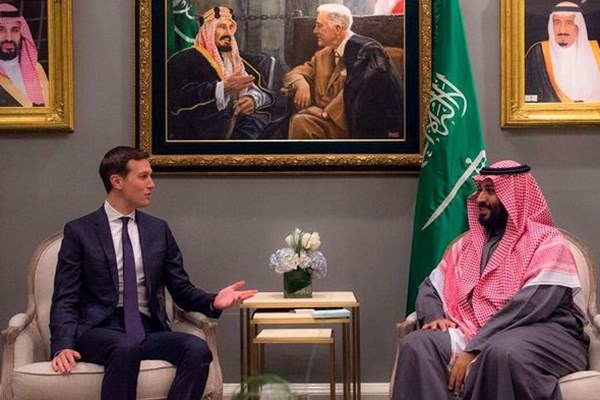On some occasions in the Arab Union, the issue of Palestine was so much sacred and respected among the Arab nations that they expelled Egypt from the Arab Union for participating in the Camp David and adopting stances aligned with the Zionist regime. However, today such a trend has been reversed among some traitor Arab rulers. Sometimes, even countries that are aligned with Palestine are expelled from the Arab Union! Notwithstanding, official normalization and publicization of Arab-Israeli relations are very dangerous and would lead to consequences which in the first stage would involve the rulers who have stretched the hand of friendship to the Zionist regime and have established political, economic and security relations and other communications with this regime.
Normalization of relations of some Arab government with the Zionist regime is indeed an American-Israeli project the management and coordination of its significant parts in the region have been delegated to Saudi Arabia which, itself, has been defined as a target country in the project of official normalization of relations with the Zionist regime. In the view of the United States and the Zionist regime, the Saudi court can play an effective role in lifting possible restrictions on the way of bilateral or multilateral relations between the Zionist regime and the Arab governments, considering the financial capabilities of Saudi Arabia and its lobbying power and alignment with other countries, in the same manner, it exploited at the beginning of the invasion of Yemen.
As it was mentioned earlier, Saudi Arabia is the most important Arab states which are in line with the official normalization of relations with the Zionist regime. Jared Kushner, the son-in-law and senior advisor to US President Donald Trump, said several days ago that Israeli-Saudi normalization is an “inevitability” while highlighting the agreement of Morocco to normalize relations with the Zionist regime. He did not refer to more details of such normalization of relations between Saudi Arabia and the Zionist regime.
There is no doubt that Saudi Arabia and Israelis are interested in publicizing bilateral relations. However, this issue is not that much simple as against the approaches and insistence of the United States and the Zionist regime that are seeking the rapid recognition of this relation so that they benefit from it politically and economically. Normalization of relations between Saudi Arabia and the Zionist regime is facing serious restrictions and obstacles domestically and externally.
Any Arab country needs to pass three stages for the establishment of relations with the Zionist regime: 1- reception and creation of secret security and political relations, 2- reception of the normalization of relations by the elites and the necessity of such normalization for the society and 3- social de-sensationalization and terminating the taboo of establishing normal relations with the Zionist regime as the main part of the normalization process. The first stage has been already taken not only in Saudi Arabia but also in other Arab governments since 2000 and these governments have now established covert and non-official relations with Tel Aviv.
However, in connection with stage two and stage three in Saudi Arabia, there are serious reservations. Still, a remarkable part of the former and present officials and political and security elites of Saudi Arabia is having serious reservations and is opposed with any agreement with the Zionist regime. That within the space of two weeks after the unprecedented meeting between Netanyahu and Bin Salman, distinguished Saudi Prince Turki Faisal levels serious criticisms of the Zionist regime in the presence of the foreign minister of the Zionist regime. He called Israel a Western colonial power which keeps Palestinians in military detention. This is the representation of a section of the former Saudi officials and elites opposed to this normalization and should not be underestimated. One cannot simply ignore these remarks of Turki Faisal who was the chief of Saudi intelligence for twenty years. Faisal is a former ambassador of Riyadh in London and Washington and has held numerous non-official meetings with the Zionists.
As with the third stage, which is the main stage of this project, Saudi Arabia is facing a serious impediment and challenge: society and public opinion. Saudi Arabia enjoys a religious and historical status among the Muslims due to Mecca and Medina; it is a country with high social, ideological and Islamic sensitivities towards normalization of relations with the Zionist regime particularly in Shia-residing areas. The significance of this issue is so much high that Khalij Online published a report several days ago on the issue of agreement between Saudi Arabia and the Zionist regime and quoted a mediator of UAE-Israel normalization accord as saying that the Saudi crown prince is worried about domestic chaos and disorder in the wake of normalization of relations with the Zionist regime and this is the main reason he is hesitating to reach a normalization agreement with Israel.
In this respect, even opinion polls do not present a positive perspective on the normalization of relations between Saudi Arabia and the Zionist regime. Samdar Biri, an expert of Arab affairs wrote in an article in Yedioth Ahronoth newspaper in November that Israelis are surprised of the information which demonstrates that only nine percent of the Saudi citizens are in favor of establishing normal relations with the Zionist regime while 88 percent of Saudis are opposed to any establishment of relations with Israelis and three percent are ill-informed about it. Some 60 percent of the Saudis participating in the opinion poll has emphasized in their response to their choice that Palestinians are more important for them than the Zionist regime. Moreover, 30 percent of those who have expressed distrust towards the Zionist regime and 10 percent have not responded to this question. Therefore, even though in recent years, Saudi society has undergone significant social, economic and civil changes, this does not mean the Saudi society is in favour of an agreement with the Zionist regime.










0 Comments